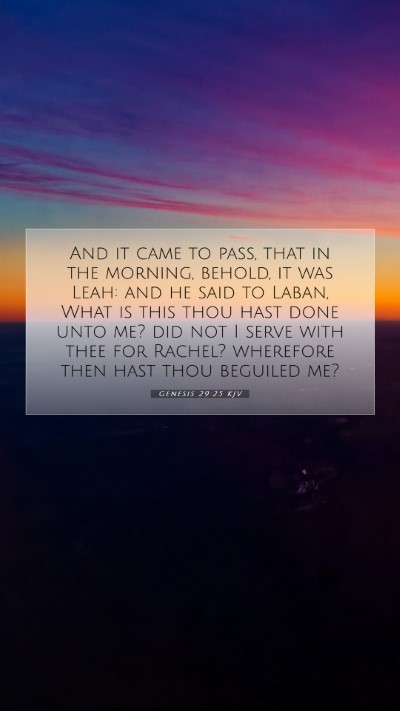Understanding Genesis 29:25
Bible Verse: Genesis 29:25 - "And it came to pass, that in the morning, behold, it was Leah: and he said to Laban, What is this thou hast done unto me? did not I serve with thee for Rachel? wherefore then hast thou beguiled me?"
Overview
The account in Genesis 29:25 presents a crucial moment in the life of Jacob, shedding light on themes of deception, desire, and the consequences of actions. The verse is packed with emotion as Jacob discovers that he has been deceived by Laban, who gave him Leah instead of Rachel, the woman Jacob worked seven years to marry. This moment serves as a rich foundation for biblical exegesis and understanding Scripture.
Commentary Insights
Matthew Henry's Commentary
Matthew Henry emphasizes the shock and disillusionment that Jacob experiences upon realizing he has married Leah rather than Rachel. He notes that this deception illustrates the providence of God, who allows such circumstances to unfold for greater purposes. Henry highlights that Laban's trickery serves as a counterpoint to Jacob's previous deceptions, creating a significant turning point in Jacob's journey.
Albert Barnes' Commentary
Albert Barnes focuses on the underlying theme of the consequences of personal ambition and the fulfillment of Jacob’s family destiny. He points out that Jacob’s love for Rachel blinded him to Laban’s deceptive nature. Barnes discusses the cultural context of marriage practices and the importance of lineage, suggesting that Leah’s unintentional inclusion as Jacob’s wife was part of God’s larger plan for the tribes of Israel.
Adam Clarke's Commentary
Adam Clarke provides a detailed analysis of the text, explaining Laban's motives and the cultural significance of Leah and Rachel's roles in Jacob's life. Clarke elaborates on the emotional impact of betrayal and the sense of injustice Jacob feels. He also discusses the concept of divine justice, suggesting that God’s justice will ultimately prevail despite human wrongdoings, using this story to illustrate character development and moral growth.
Key Themes and Applications
- Deception and Consequences: This verse underscores the theme of deception, showcasing the moral complexities of relationships and choices.
- Divine Providence: Jacob's experience reflects the belief that God has a plan, even amidst human failings and disappointments.
- The Quest for Love: Jacob’s unwavering desire for Rachel represents a deep longing that drives human action—often leading to unexpected outcomes.
- Character Development: This event marks a pivotal moment in Jacob’s life, shaping his character through adversity and challenges.
Related Bible Verses
- Genesis 27:35: Jacob deceives Isaac, a parallel to the deception he experiences.
- Genesis 30:1: Leah’s subsequent struggle for Jacob's affection highlights the ongoing theme of rivalry and desire.
- Romans 8:28: Reflects the belief that all things work together for good to those who love God, paralleling Jacob’s story.
Final Thoughts
Genesis 29:25 serves as a potent reminder of the complexities of human relationships and the interplay of divine purpose within our lives. Understanding this verse through various commentaries deepens biblical verse interpretations, enriching our Bible study insights. It encourages us to reflect on our actions, the motives behind them, and the greater plans that may unfold from our experiences.


